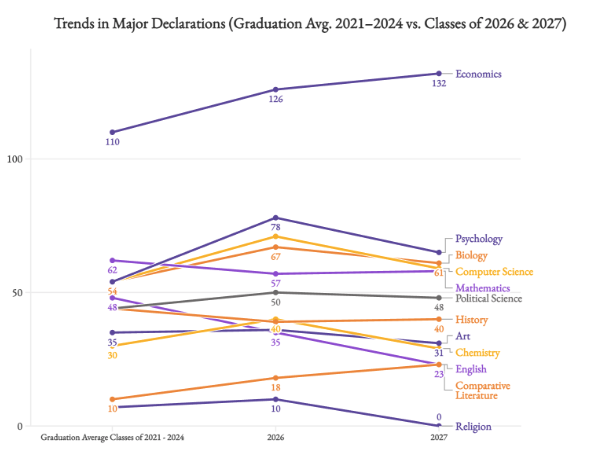On Monday, President Maud Mandel hosted a forum dedicated to discussing long-term planning at the College. In an email sent to the student body on Oct. 2, one of the few pieces of publicity for the event, Mandel described the gathering as an opportunity to ask, “what are our goals for the college in the coming decades, and what programs and initiatives do we think will help us get there?” The forum took place from 2:30 to 4:00 p.m., during class hours, in Paresky Auditorium and was attended by approximately 10 students.
Mandel began the forum by presenting the goals of long-term planning. In her presentation, she described the planning process as “a way to define priorities and focus investments” and “a chance for us all to work together toward a shared future.” Mandel credited the beginning of planning efforts to the recently completed accreditation process and Teach It Forward campaign, as well as the start of her presidency. The presentation emphasized an ideal planning process as “inclusive,” “effective,” “connected to ambitious but achievable goals” and “specific, but also adaptable.”
Mandel also laid out eight broad, guiding questions that she hoped would inform the planning process. The questions included concerns over promoting student readiness for life off-campus, supporting faculty and staff, making the College an inclusive space and maintaining involvement with local communities. At first, Mandel explained that the planning process will deal with broader concerns, which she called “strategic planning at its first level.” Over time, however, the process is designed to lead to specific recommendations that could even be applied to other institutions of higher education. “Williams can use its platform as a model for other schools,” Mandel said.
Despite low attendance, the forum featured a lively discussion between Mandel and students who were present on specific perceived issues at the College. Benton Leary ’20 criticized the vagueness of the College’s operating budget, which makes it difficult for students to understand the financial costs of proposed initiatives. “Decisions about specific initiatives is something I do hope planning will help us understand,” Mandel responded. However, she also expressed her office’s limited capacity for change in certain financial matters. “The fiduciary responsibility of the school rests with the board,” she said.
Other students presented a variety of concerns and suggestions. Crystal Ma ’21 asked about the possibility of the College providing post-graduation land grants to students interested in agriculture, which Mandel used as an opportunity to compare past and present missions of colleges and universities. “What you do after graduating was not something that institutions of higher learning used to focus on,” she said, before calling Ma’s idea an interesting one. In response to concerns that the College funnels many students into medical or consulting careers rather than fields like agriculture, Mandel posited that “some of those pathways represent the assumptions of the student coming in.”
Hattie Schapiro ’19 brought up the summer earnings requirement, arguing that its presence limited internship and vocational opportunities over the summer for students on financial aid. Mandel responded by stating that any piece of financial aid given to students must be counterbalanced by cost reductions elsewhere, but simultaneously emphasized a commitment to providing students the resources necessary for success. “We will be thinking about the tradeoffs of financial aid opportunities,” she said. She gave a similar response when the lack of need-blind admission for international students was brought up by Linda Worden ’19.
Other questions and concerns circulated around financial aid for winter study, divestment from ecologically harmful industries, criminal background checks on staff, student loan policies and class sizes. In response to a concern about large computer science class sizes in particular, Mandel agreed that a problem existed. “Computer science is really struggling,” she said. “We are trying to fix it and that will not wait for strategic planning.” Mandel added that financially lucrative jobs in computer science and statistics may discourage some people from becoming professors, and therefore the large class sizes may be attributed to market forces rather than any College policy.
In response to a question on the disconnect between a student focus on vocational preparedness and a College emphasis on the liberal arts education, Mandel saw the two as connected. “I deeply believe in the liberal arts education,” she said, but added that this belief does not solely entail learning for learning’s sake. “You’re learning a set of transferable skills like public speaking and writing that can be brought into a wide variety of jobs,” she said. From her vantage point, faculty seem to understand the practical applications of their classes. “Faculty do have a really good sense here that most students won’t go on to become faculty members,” she said.
This conversation was a first step in a longer strategic planning process that will stretch until at least 2020. A strategic planning coordinating committee has already been created with two student representatives, along with numerous faculty and administrators. In the 2018-2019 academic year, this group will hold forums, create working groups and subcommittees and solicit proposals from the larger campus community. “We’re doing the planning of the planning this year,” Mandel said.








